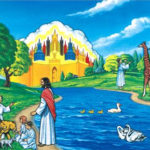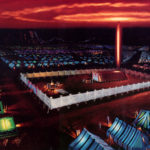Will Fiction Last Forever? Part 3
 Call me unspiritual. But if I tried, I might find a way to start this column in a dull way, especially if you’re (here comes the clichéd gluttony joke) hung over from turkey.
Call me unspiritual. But if I tried, I might find a way to start this column in a dull way, especially if you’re (here comes the clichéd gluttony joke) hung over from turkey.
How? By quoting a Bible paragraph or verse, instead of saying something “new.”
This principle might also prove true — especially apart from God’s grace — if you had an hour of reading time before bed, and two books on a table. One is a speculative novel, new and shiny, with a fun cover, fascinating back-cover text, and crisp white pages. The other book is the Bible. The challenge: which would you be inclined to pick up first?
If you’re like me, you’d think to reach for the novel.
Already caught a Devotion this morning. Already know whatever I would read in the Bible. Most of us will shut down such thoughts. But even to have them at all is embarrassing!
I don’t say this to give blame, or an I’ve-beat-this-and-you-can-too sentiment, or put-on humility meant to drag us all down (ohhh, I’m such a sinner and so are you!). Rather, I’m admitting a struggle common to Christians. And this should, I hope, encourage us — for apart from Christ, we wouldn’t even struggle with reading His Word!
Yes, “Bible fog” seems to be a phenomenon unique to Christians. It’s also encouraging because this struggle could be secondary evidence that this Book, apart from any other, is the very Word of God. Why else would our flesh, and/or the Devil, resist it so much?
Nonfiction books, biographies, documentaries, and (true!) sermon tropes reference the countless ways in which the flesh and the Devil have tried to extinguish God’s Word. Usually they ignore it. When that doesn’t work, they make mockery (witness the recent attempts by some to shut up a certain public-God-praising football player). Lest that prove their laughable level of discomfort, they revert to ignoring, or else more-subtle modes of intolerance of the Bible: prosecuting public Biblical references, or sometimes (as in before the Reformation) keeping it from being translated into common languages.
Some folks, of course, ban or burn the Bible. Given the level of hatred toward this book far beyond Christians’ struggles to dig deep into it, it’s really quite amazing that we have so many copies of original texts — more than copies of, say, Homer’s works, I’ve read.
It also seems amazing that we need fight to maintain our fascination with God’s Story.
Even more amazing could be to doubt that the Word, after surviving hundreds of years of hatred and persecution and ignorance on our old Earth, would not last into the New.
The everlasting Story
 In this series, I’ve tried to lay a Scriptural foundation for why various things, done for God’s glory, may last into the After-world — the physical, sin-purged, made-new New Heavens and New Earth. Much of this is founded on promises God has made, such as to preserve Israel’s homeland, and to bring Heaven to this Earth-made-new (and not to annihilate Earth to replace with a completely new creation; see last week’s column).
In this series, I’ve tried to lay a Scriptural foundation for why various things, done for God’s glory, may last into the After-world — the physical, sin-purged, made-new New Heavens and New Earth. Much of this is founded on promises God has made, such as to preserve Israel’s homeland, and to bring Heaven to this Earth-made-new (and not to annihilate Earth to replace with a completely new creation; see last week’s column).
Other parts of this discussion are speculation. And that will likely include next week’s exploration of why manmade stories, of today, could last into the eternal world.
Yet the truth of Scripture’s eternality should, I think, be beyond doubt or questioning.
Forever, O LORD, your word
is firmly fixed in the heavens.Your faithfulness endures to all generations;
you have established the earth, and it stands fast.Psalm 119:89-90
A voice says, “Cry!”
And I said, “What shall I cry?”All flesh is grass,
and all its beauty is like the flower of the field.The grass withers, the flower fades
when the breath of the LORD blows on it;
surely the people are grass.The grass withers, the flower fades,
but the word of our God will stand forever.Isaiah 40: 6-8
[Jesus speaking] “Heaven and earth will pass away, but my words will not pass away.”
Matthew 24:35
That alone would establish the case: God’s Word will last beyond this old Earth. If kings, despots, heretics, and other villains couldn’t purge the planet of His Word, then His own exposing and refining fire (2 Peter 3:10) cannot include wiping out His own Word.
 Secondary support for the Bible’s everlasting existence comes from the Book’s own direct prophecies about the New Earth. As discussed last week, the New Earth will come after the present-day afterlife. Even Heaven will be made new along with “the creation itself” that had been groaning with “we ourselves” (Romans 8), when at long last “the dwelling of God is with man” (Rev. 21:3)! The New Earth will be a physical world, with physical people in physical resurrected bodies (2 Cor. 5). We will recall our former lives (Rev. 6: 9-11 — martyrs even knew they had been murdered and longed for God’s justice). We’ll see Christ clearly, a far better perspective of reality, not as “in a mirror dimly, but then face to face … fully, even as I have been fully known” (1 Cor. 13:12).
Secondary support for the Bible’s everlasting existence comes from the Book’s own direct prophecies about the New Earth. As discussed last week, the New Earth will come after the present-day afterlife. Even Heaven will be made new along with “the creation itself” that had been groaning with “we ourselves” (Romans 8), when at long last “the dwelling of God is with man” (Rev. 21:3)! The New Earth will be a physical world, with physical people in physical resurrected bodies (2 Cor. 5). We will recall our former lives (Rev. 6: 9-11 — martyrs even knew they had been murdered and longed for God’s justice). We’ll see Christ clearly, a far better perspective of reality, not as “in a mirror dimly, but then face to face … fully, even as I have been fully known” (1 Cor. 13:12).
Physical resurrected beings in a physical resurrected world, with memories of our past lives along with far greater perspective as we see Christ face to face. … How could we not also want His perfect written revelation through which we first came to know Him?
“I’ve always thought that we wouldn’t need the Bible anymore in eternity, that the faith being made sight would remove all need for it,” reader Paul Lee said last week. “But the idea of reading the Scripture in eternity is intriguing in a way… the use of the text would have changed. It would be a record, a testament, to the salvation of God in the past.”
Amen. And the word testament is a giveaway, I think, to the fact that we already know a little about what that would be like! We have the Old Testament, a book of incredible mysteries for previous readers, and still many mysteries today — but less than before.
- Where once readers heard Isaiah’s and others prophets’ words about a Savior, who was both a conquering King and a suffering servant, and confused the two comings — with Christ’s arrival, we know a little bit more about the difference.
- Where once we might wonder why God created an institution like marriage, Paul claims that all along it had been patterned on Christ and His Church (Eph. 5:32).
- Once no one knew the amazing Story God had waiting. Now He has shown it:
But, as it is written,
“What no eye has seen, nor ear heard,
nor the heart of man imagined,
what God has prepared for those who love him”—these things God has revealed to us through the Spirit. For the Spirit searches everything, even the depths of God.
1 Corinthians 2:9-10
If even on this old Earth, without resurrected minds and with less perspective, we can glory in the mysteries of the Old Testament that God has shown to us, imagine the even greater wonder of looking back on both Testaments as the epic record of God’s Story.
Worship in the Word
Knowing all this about the coming After-world, anticipating it, studying it, trying to balance between taking God’s promises at face value and not speculating beyond that — all this forges even greater faith in the truth, and the wonder, of God’s everlasting Story.
Especially on this day of thankfulness to the God of truth and beauty, I almost want to break out — like the apostle Paul right in the middle of deep theologizing (Rom 11: 33-36) — in praise and worship. This would attend our wonder at how Scripture will seem to us on the New Earth. It may also increase our awe at His incredible Word, awe that echoes backward from that made-new world of clarity and wonder — back in time, and into our old-and-groaning world of dim murkiness, boredom, and “Bible fog.”
It seems cliché to say “the Bible is not just a textbook, it’s a story.” That “rebuttal,” to something few claim to believe, itself needs some rebutting. Scripture does give us facts, theology, history, law. And some Bible-is-really-a-story folks may actually tell the wrong story. Yet how often do the heresies and false teachings and our own sin-struggles make us use the Book, maybe not like a “textbook,” but like a personal-repair manual?
Conversely, how many times do we go through this angsty little dance: I don’t want to read it because I don’t feeling like I want to, and I know I should, and I really should feel in advance that this is God’s perfect Word and He has something to say to me through it, so I ought to be grateful and overflowing with thanks, just like in church — so why don’t I?
Just now I realized what else that sounds like: writers’ block. Writers among my readers may identify. Yes, sometimes you need to leave the desk and eat, get some sleep or some coffee, and come back for another try. And sometimes you need to write anyway. Belay the distractions and other don’t-want-to excuses. Belay the don’t-feel-like-its. Yes, you do feel like it. Deep down you do. Otherwise you wouldn’t hate the struggle.
With Scripture, the solutions might be similar. But there may be one added factor that doesn’t get discussed often: that perhaps we over-complicate reading Scripture.
Make no mistake. There’s definitely a time for word studies, journaling, and going deep.
Yet there’s also a time just to read the Story. To pray that God’s Spirit will remove the mental fog and make what’s on the pages come alive. Read it all the way through, and pick up on details later, after we’re reviewing, and living, the Story of stories.

It also helps if you can time-travel into "Bible times" ...
Something I’ve been doing recently is reading aloud. Acting it out. This imagination is good for something! My wife and I have been reading Ezekiel. And hearing God’s words, repetitions, warnings, and scary wrath, not just silently but out loud — the emotions arrive naturally. On Tuesday night I was almost shivering as I finished Ezekiel 5-6.
Very strange how pretending can sometimes make reality seem even more real.
Yet my guess is that on the New Earth, acting it out won’t even be necessary. What would it be like to read the Word itself with the Word Himself (John 1:1)? What would the risen and reigning Christ sound like during, say, a public reading? What translation would He use? (Ooooh!) Which truths would He clarify? Which might He save for later?
These are only a few of many thoughts and wonderings. I wish I had time for even more about the Story we’ll enjoy forever, and for which I wish to be thankful today.
Next: other stories. How does God’s everlasting Story hint those may also last?









































Aww, it’s Superbook! My first anime before I knew what anime was! <grin>
Very good article.
Thank you. Bravo. You nicely corral the herd (your thoughts) into the paddock. That may sound silly but writing is about thinking.
I believe that one of the difficulties we have with preferring to read other things rather than the Bible is that much of it was meant to be read aloud to the assembly of believers (O.T. and N.T.). Perhaps that’s part of the reason why your reading of Ezekiel with your wife is so meaningful. So little of the Word is read aloud in worship services–at least whole passages in context. It’s meant to be heard, chiefly. This is not to undercut the importance of private devotions, and the gift of the Word in our languages; but I feel like ‘devotions’ should be mostly ongoing fellowship and conversation with the Lord. His Word isn’t something to just pick up because it’s time for that.
About its lasting. Yes, it’s eternal as you’ve shown. Everything about Him is infinite and everlasting: He spoke it.
This is an interesting and relevant post, since “Bible fog” is such a re-occuring problem, at least for me. But I’m confused about some things.
What is the distinction between God’s Story and the Word of God? Do both terms simply refer to the Bible? Is the Bible itself the Story, or is it the medium through which the story is told to us? I can tell that “Word of God” is essentially synonymous with the Bible, but we know that Christ is also the Word of God, from John 1:1. But we know Christ Himself is not the same thing as the Bible, even though the Bible conveys His story.
If the literal text of the Bible is God’s eternal Story, then I apparently have no place in that Story. God’s Story is the only one that matters, because it’s the only one that is true. What God invents is truth and always comes to pass. I love speculative fiction because it satisfies me in ways that reality cannot, but I believe that in some abstract way that speculative fiction is more true — more like God — than the imperfect reality that I see. But when God Himself has come to dwell with man, and imperfection is gone, no human story will satisfy me. I want to have a part in God’s eternal Story, or else I am worthless!
Or am I being proud beyond the place that God ordained for me, just like Lucifer? 🙁 I don’t know.
But I’m certainly thankful for the Bible, for it’s whispers of concrete truth that transcends the muddled fog of this life. I think “Bible fog” is natural; it’s simply the result of not being able to see the epic romance and eternal significance of everything that we do. Happy Thanksgiving!
Hey back, Paul. Some of this is my own personal “jargon,” I think. Though I can definitely understand Kaci‘s reluctance to use the word “story” about the Bible (see below), I personally don’t have a similar issue (at least not so far) and substitute “true story” in my mind — similar to how Tolkien and Lewis referred to God’s “true myth.”
I use them interchangeably, especially by capitalizing the word Story, or saying things like “Story of stories.” Moreover, the “subplots” of the Bible — say, David’s life, or the Noah account — can count as the lowercase-S stories that all fit into the big Story, all of the Bible itself, the whole Gospel.
I’d call the Bible itself the Story. As for our own place in it, further thoughts later, I hope … because I’m sure our lowercase-S stories matter just as much in the greatest Story, even if we don’t also (and presumably won’t) have books named after us!
There’s a ministry team at my college called Ezra’s Creed that does choral or singular readings of the Bible–no costumes, no backround music, but just reading it aloud.
And it is one of my favorite chapels.
That’s wonderful, Galadriel! I can see why it would be one of your favorite chapels!
How do you interpret this passage?
Isaiah 65
17For, behold, I create new heavens and a new earth: and the former shall not be remembered, nor come into mind.
18But be ye glad and rejoice for ever in that which I create: for, behold, I create Jerusalem a rejoicing, and her people a joy.
To the question: “What stands out in your life?” – By default, I think of the bad (sinful) things I’ve done. I’m don’t want to remember these for eternity. The same can be said of unsaved family and friends. I don’t want to remember them, nor their fate, forever. I believe these memories will be wiped away along with our tears at the judgement.
I looked up commentary on the “eye hath not seen” passage in I Cor. 2. The specific context examples the crucifixion of Christ, but isn’t confined to just that event.
7But we speak the wisdom of God in a mystery, even the hidden wisdom, which God ordained before the world unto our glory:
All the hidden things of God are going to be as unpredictable and spectacular as the death of His very Son, unto our undeserved glory.
Happy Thanksgiving, Bob! Just got back from dinner, in time for a few thoughts.
Context? I mean, not the passages’ context, but first, what’s the context of your question?
I might guess you meant the part about “the former shall not be remembered …” (in the ESV: “the former things shall not be remembered or come into mind”). If that’s it, then there must be some way to harmonize this with a passage like Rev. 6, about the martyrs who recall their own deaths. I might do some Hebrew checking on this part, because it seems clearly related to the previous context:
The forgotten “things” in verse 17, then, is a continuation of personal troubles, and seems to be a way of reiterating that we won’t have them anymore — not that our minds are wiped completely clean of old-Earth memories.
This part really does seem to be a Gospel-based issue, because if we’ve somehow in the After-world forgotten bad stuff, we’ll have forgotten a huge part of the Gospel. So we would have forgotten what, exactly, God had to do for us. The continuing presence of God’s Word, plus the nail scars in Christ’s hands (He’s still in His resurrection body, and presumably will always be), plus the Rev. 6 memories, plus the books of life records opened (Rev. 20:12) show direct continuity of memory.
This would seem to be one of those mysteries about the New Earth. How could I remember doing that horrible thing and still have Heaven be Heaven? Yet even now I can remember some sin I committed, and thank God that He is all the greater and saved me anyway, or some suffering I went through, after which I can even now see that He was using it for good. If we get a little of that now, imagine the far superior perspective we’ll have then? The memory of sin makes His light shine even brighter.
I haven’t found Scriptural evidence one way or the other. But I can only suggest that we will, in some sense, look upon their fate (sealed for eternity) more from God’s perspective. He doesn’t forget the fates of those whom He must, because of His perfect justice, punish for rejecting Him. I doubt we will, either, though this definitely seems strange to consider from our limited viewpoint on old Earth.
Either way, it refers to things that God has since revealed to us by His Spirit (verse 10). Other verses talk about things not revealed, known only to Him, not us.
To speak or impart that mysterious hidden wisdom means it’s no longer a mystery. (Again, other things are, for sure — they’re just not in view in this verse.)
Amen! This was echoed even in the OT, about both hidden and unhidden truths:
“Secret things”: God’s. His alone. Don’t mess with ’em.
“Things revealed”: ours to keep, and to pass along to others and future generations.
Bob, I like your response! Future Things will be spectacular.
Some things won’t be remembered or called to mind, yes. Some things will last–they’re eternal. He is forever the Lamb of God, as in Revelation where He is the Lamb that was slain, and the King gloriously appearing from Heaven, His robes having been dipped in blood.
What a sneak-peek into our future, that spectacular verse you referenced in 1 Cor. 2!
“Conversely, how many times do we go through this angsty little dance: I don’t want to read it because I don’t feeling like I want to, and I know I should, and I really should feel in advance that this is God’s perfect Word and He has something to say to me through it, so I ought to be grateful and overflowing with thanks, just like in church — so why don’t I?”
Oh, I SO relate to this. And it is very much like writer’s block, I agree! I hadn’t ever thought about that before.
“Yes, you do feel like it. Deep down you do. Otherwise you wouldn’t hate the struggle.”
By the grace of God working in my heart, yes indeed. 🙂 I will be remembering this next time I am vacillating about whether I am “in the right mood” to spend time in God’s Word!
If it’s alright, I’m going to follow a tangent for a bit, because I think it merits some discussion.
Maybe, maybe not. It’s about the same as when I’m in church and an idea for my current story hits, or when I’m in the middle of my Bible reading and an idea hits. God wired me a particular way; and I don’t think it offensive for me to run off, get that out of my system, and come back. I’m not convinced it should be embarrassing. The Pharisees could quote the entire Old Testament by the time they were 13 and spent the better part of their lives in study. Jesus called them whited washed tombs and broods of vipers…and in Matthew 23 he calls them ‘sons of Hell.’ In fact, in John he says “You search the Scripture in vain because you think that in them you have life, but you will not come to me of whom the Scriptures speak” (5:29?).
I’m always a bit leery of the Bible-as-story metaphors, strictly because I have to keep fantasy and reality very separate in my head. So I don’t really like using terms like “Bible characters” and “Bible stories” — or even “Biblical/Biblical historical fiction.” To me the language matters. I know it’s picky.
There’s something I was told that I tell my friends newer to the faith: You are not going to Hell because you didn’t read your Bible today. Bible reading is like any other habit: it takes time. I usually tell people to start with 1-3 chapters a day and just keep going until it becomes natural. And it’s like anything else: If you stop, it takes awhile to get back into it again. It’s a mental shift that has to happen and isn’t happening overnight.
I also think mixing up different ways of reading it help (follow a reading plan one year, do a chronological the next; do all the prophets one year; read all of Paul’s letters, then all of John’s; etc). It allows you to read the same material from different angles, and it keeps the routine from feeling monotonous.
And don’t read when you’re tired, period. Sometimes God talks; sometimes he commands food and rest for several days before he determines you physically and emotionally prepared for a conversation.
Also, if one chapter’s really long, don’t get discouraged if you only get through that one chapter. Flip forward; if one’s really short, maybe do the extra; if you don’t have time for the full X number, then do what you’re able.
Anyway, I dunno. I actually haven’t done my Bible reading in a few days, so….church brat, signing off. 0=)
We got into a discussion on this in Sunday school a few weeks ago…one of the points that I thought I’d bring up is that sometimes God shows me the bigger things when I’m not expecting them…ie, I’m going to chapel for the credit, but that’s the day the speaker says something I need to hear.
Oh, definitely.
You know, sometimes, we do things for our friends or family because we love them, not because we particularly want to do that thing. And sometimes I think it’s that way with God.
Kaci, I’ve been taking a similar journey. Though I know that getting ideas in the middle of, say, a church service can become a distraction, it’s helped to see the creative process as just as much a kind of worship as the singing. An idea, then, is just a different form of worship, not a lapse from worship to non-worship.
As I mentioned above, it doesn’t bother me, though I can understand it being bothersome. Subconsciously I substitute the term true story, I think, to distinguish it from a made-up story. And yes, language does matter — perhaps it would be better first to define the term story as an account of events, with hero, plot, and resolution, that could be true or fictitious. However, especially in situations such as children’s Sunday school, when we already have enough issues with people referring to “Bible stories,” as if these are like Aesop’s Fables or the Book of Virtues, I do prefer to refer to, say, the account of Noah, or the account of Christ.
So far, most of my reading has been aloud. … That leads me back up to Maria‘s thoughts, above, about how Scripture really does seem meant to be read aloud, and together, not just with individual emphasis, but for the community of believers.
Of course, New Year’s is right around the corner. So this discussion is a bit in advance of the Bible in One Year Reading Plans. In the past I haven’t had much success with those, partly because of lack of discipline, and partly because I do tend to get stuck on the data-mining-and-bypassing-the-enjoyment aspect of reading!
I forgot to reply.
Eh, if it happens to me, I literally have no idea what happened in church that day. But like I said, I don’t consider it particularly heinous, either.
It’s not the Eighth Deadly Sin or anything, but in a world in which I’m surrounded by people who already have enough trouble distinguishing reality and fantasy, well, I just like to keep it simple. It’s a bit like my never having trouble with the whole “Is Santa Real?” thing because I understood St. Nick to have lived a long time ago, and the whole Santa thing is in his memory. The rest just makes a nice story.
I’m not sure there’s really a definition problem; my telling you about my Christmas shopping trip with Mom yesterday contains all the elements of a story listed, and it’s equally real. It’s this quirk I have in which I feel the bigger the anchor I have on reality, the better off I am as a writer and as a believer.
Like I said, it’s just my preference; it’s not something I think everyone must do.
Well, it was written to an audience who was predominantly from oral tradition, so yes, it’s a bit lyrical, wisdom literature , prophets, and letters especially.
There’s a friend of mine who, again, is relatively new to the faith, and she mentioned that one time: she tended to take forever finishing a workbook lesson (or not finishing) because she’d get interested in something and before she knew it she’d bopped around the Bible and never finished the lesson.
I told her, though, that the Spirit does what he wills, and if he has it in mind that Workbook A is going to get you to Passage A so he can prompt you to B, C, D, and E, then don’t fight it. Ever.
This is a good post/discussion for me. I tend to not read much of His Word at times. Right now my way of doing things is to wait for daily life to call it up from the place where I’ve already hidden so much in my heart. When I approach tasks, conversations, I see them in light of what I know from His Word. However, I need to remember that Psalm 119 records this for us: “I will not neglect Thy word.” (emphasis added) And what if I don’t have the context right? We all can do better with His strength. We do need to remember, though, that we are His workmanship. He is at work all the time and we need to trust Him even in this area, to bring His Word to us in His way and time.
Coolness.
Now that was well-said.
I was listening to a sermon, once, that talks about remembering why you started the habit to begin with. As an example he uses the illustration of a man who’s a hardworker, and, to provide for his family, takes on more and more work and longer and longer hours until he’s completely lost sight of the whole point: to be there and provide for his family. Anyway, you bring up that point: We don’t ‘read our Bible’ for the sake of reading our Bibles, but so that he can continue the work he began. *
*Miscellaneous aside: It’s different for people in places without Bibles, obviously.
Kaci, so we must continue to do the right thing for the right reasons, for the Person we love. And remember others who don’t have their daily bread in more ways than one.
Now that was well-said.
Thanks, Kaci! a lil bit of encouragement = A HUGE THING.